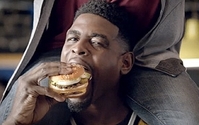sports
Burger King's Hirschhorn Talks Media Strategy At Sports Marketing Symposium
- by Karl Greenberg , October 14, 2014

Eric Hirschhorn, CMO of Burger King, who basically had zero marketing experience when he came to the company from an investment banking law firm, said the learning curve has been steep, but the lessons clear: the best sports/brand relationships are "open source," meaning collaborative partnerships that aren't limited by contractual stipulations. And signage is a waste of money.
Speaking at Sports Business’ CSE Sports Marketing Symposium in New York on Tuesday, he said that BK is first and foremost a media buyer with sports. “Sports are the last live, high-impact media property that exists. And we want to make sure we are buying best properties.” Venue-specific activations, whether they involved spectators, or that they benefit players, such as Gatorade’s sideline presence, make no sense for a brand that doesn't have 100% ownership of the event, or a gigantic marketing budget. That was a lesson from the QSR brand's association with the NCAA last year, which he described as hitting a double, not a home run.
advertisement
advertisement
He said in the first year with NCAA hoops the brand activated well against a high-impact media property, around events like NCAA March Madness and the Final Four, "But we were trying to localize too much, and onsite activation only touches local markets; if you are a brand with a footprint like ours, it has to have reach. So we see activation as media activation."
He added that sports branding runs along a continuum: endemic brands, and then brands that are ubiquitous in marketing, with budgets so big that they can dominate a property with 100% share of voice. “But for the majority of us, we are neither. We have meaningful budgets, but we don't make shoulder pads. For Burger King, we have 100% awareness, so slapping a logo on a property is meaningless. The challenge is how to integrate in meaningful way."
He said that although onsite programs around the season were "good", Burger King will cut back on those, and when it does do local activation it will have national reach. "We did some interesting things like bringing 25 bloggers to games to amplify at a property we had access to. They told the story, while integrating our brand in their storytelling narrative to their audiences. They brought more authenticity to it than anything I could say."
As far as coming from outside the CMO world -- or being an "anti-CMO" as he put it -- and coming from the investment bank side, he said he saw analytics as a key advantage because the radical changes in the media world demand that perspective. "My team is made of engineers, former bankers and consultants; we have few traditional marketers because the role requires much different skill sets today than it did even five years ago. Media has been a 'black box' for a long time. We find it important to get every little detail to maximize spend. We had to start from scratch."


